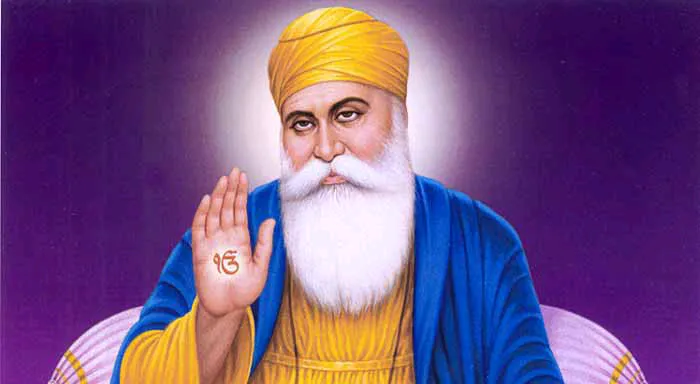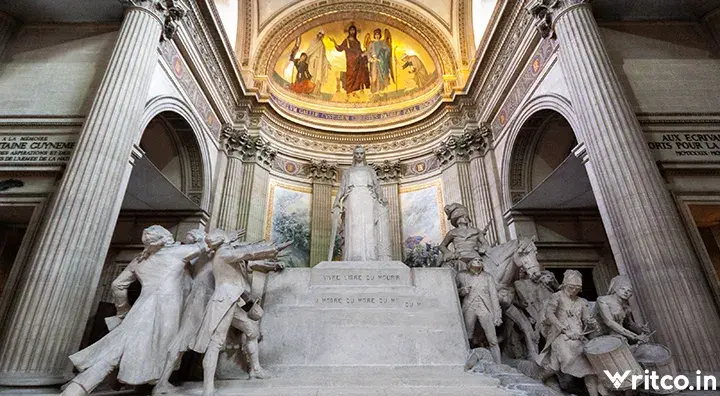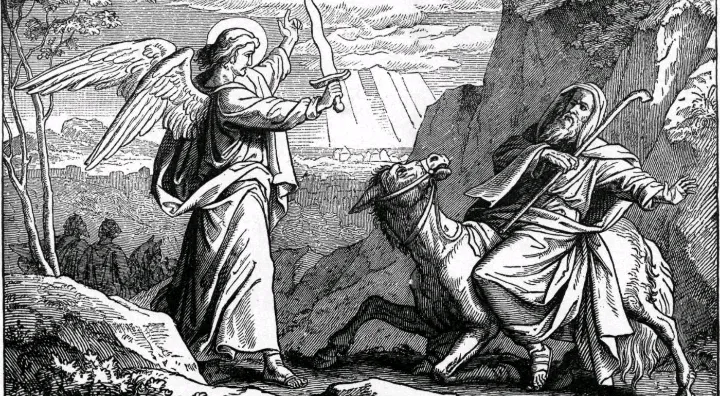10 Guru's Of Sikh
Q. What does Guru mean?
Ans. Guru is a Sanskrit term for a mentor, guide or expert. For Sikhs however, the gurus were more than just teachers. They believe the gurus are messengers from God. In Sanskrit, the word guru literally translates to 'the dispeller of darkness'.
The word 'guru' is thought to have first been used in Hinduism. The guru was a school run by gurus and was established in India before the 1st millennium BCE.
••••••••••••••••••••••••••••••••••••••••••••••
1: Guru Nanak Dev Ji
The Sikh Guru, Guru Nanak Dev ji was the founder of Sikhism and was the first of the human Sikh gurus. He was born in 1469 in a place that is now called Nankana Sahib in Pakistan.
He did not claim to be Hindu or Muslim, but as someone who believed in God and truth. He also preached to people that Hindus, Muslims and all people who believe in God are equal.
Guru Nanak travelled all over India and the Middle East speaking out against religious rituals, pilgrimages and the caste system. The caste system was how society was divided into different groups based on wealth or what people did as a job. He spoke to many different people, from Muslims and Hindus to Buddhists and Jains. When he spoke to people he never asked them to follow him, instead, he told them to remain true to their faiths and to carry on believing in their God.
2:Guru Angad Dev Ji
Guru Angad was the second of the Sikh gurus and was born in 1504. He created the Gurmukhi, which is the written form of the language Punjabi and taught this to many Sikhs throughout his life. Soon, this became very well-known among people.
A firm believer in education, the Sikh Guru Angad founded many schools for children and helped to improve people's ability to read and write. He also began the tradition of Mall Akhara - which was a form of physical and spiritual exercise.
3:Guru Amardas Das Ji
The Sikh Guru, Guru Amar Das was born in 1479 and fought against caste prejudice. He wanted everyone in society to be equal and did not think it mattered if someone was rich or poor.
He also built on Guru Nanak’s idea of the ‘free kitchen’ which was an idea that said that all followers should eat together in the same place, no matter how rich or poor they are or where they come from. Guru Amar Das was quite successful at this and managed to create more equality for people.
He also introduced Anand Karaj - which was a special kind of marriage ceremony and created some new customs that meant women had more independence and equality.
4:Guru Ram das Ji
Guru Ram Das was the fourth of the Sikh gurus and was born in 1534. He founded the city of Amritsar in northwest India, which is now the holy city for the Sikhs and also started construction of the Golden Temple. This is a very important temple for Sikhs, and still stands today! It is open for anyone to visit - every day of the year. It even stayed open in the Coronavirus pandemic.
To learn more about the Golden Temple, take a look at this hotspots activity that allows you to click through all the different areas and features of the temple.
5:Guru Arjan Dev Ji
Guru Arjan was born in 1563. A great scholar, Guru Arjan compiled the scriptures of the Sikhs, known as the Adi Granth. He tried to teach as many people the scriptures as possible, so included it in hymns about Muslim saints too.
He also finished the construction of the Golden Temple in Amritsar that Guru Ram Das has started. They constructed it with four doors facing in four opposite directions, to show that they welcomed people into the temple from anywhere and from any background.
Guru Arjan was ordered to be executed by the Emporer. This was because the Emporer was Muslim, and believed that Guru Arjan shouldn't include Islamic references in the Sikh holy book.
6:Guru Hargobind Ji
Guru Hargobind was born in 1595 and was the son of Guru Arjan. Known as the ‘soldier saint’, Guru Hargobind was the first of the Sikh gurus to teach people that sometimes it was necessary to take up arms and go to war to defend the faith. This was because he believed that no violence could actually encourage other evils to come about. He also believed that this was a way that people could protect the weak and needy, so he organised a small army.
7:Guru Har Rai Ji
Guru Har Rai was born in Guru Ram Das was the fourth of the Sikh gurus and was born in 1534. He founded the city of Amritsar in northwest India, which is now the holy city for the Sikhs and also started construction of the Golden Temple. This is a very important temple for Sikhs, and still stands today! It is open for anyone to visit - every day of the year. It even stayed open in the Coronavirus pandemic.
To learn more about the Golden Temple, take a look at this hotspots activity that allows you to click through all the different areas and features of the temple. and was a very peaceful leader. He devoted himself to spreading the teachings of Guru Nanak and taking on missionary work. This means that he travelled around spreading the messages of the other Sikh gurus and the Sikh faith. He also meditated a lot and encouraged people to do the same.
Although he was a very peaceful man, he didn't abolish the army that his grandfather - Guru Hargobind - had created. Instead, he distanced himself from it physically and never used it himself to solve conflicts with the Empire.
8: Guru Har Kishan Ji
Guru Har Krishan was born in 1656 and installed as a guru only five years later! He was the youngest of all the Sikh gurus.
Guru Har Krishan was a humanitarian, which meant that his main aims were to help people. Throughout his short life, he mainly helped heal people in Delhi who were suffering from a smallpox epidemic. He helped many people, no matter where they came from or what their religion was.
Sadly, Guru Har Krishan gave him life helping people, as he soon contracted smallpox himself and died before he turned eight.
9: Guru Teg Bahadur Ji
Guru Tegh Bahadur was born in 1621. He believed strongly that people should be allowed and have the freedom to worship whatever religion they wanted. For this reason, he defended the Hindu religion to try and protect Hindus from being forced to convert to Islam. He also refused to convert to Islam and was executed and martyred as a result.
10: Guru Gobind Singh Ji
The 10th Sikh Guru name is Guru Gobind Singh was the last of the human Sikh gurus. He was born in 1666 and was the son of Guru Tegh Bahadur.
He introduced the Khalsa, or ‘pure ones’ and the ‘five Ks'. Just before he died in 1708, he proclaimed Guru Granth Sahib - the Sikh scripture - as the future guru.
This is why the Guru Granth Sahib means so much to people of the Sikh faith. They see it as more than a holy book, but as another guide that they respect in the same way, and a teacher showing them how to live their lives fully. Guru Granth Sahib is often classed as the 11th Sikh Guru.
•••••••••••••••••••••••••••••••••••••••••
Waheguru ji ki khalsa,Waheguru ji ki fateh
Jo bole Soh nihaal
Sat shri Akaal!!🤲🏻
© SALONI
Ans. Guru is a Sanskrit term for a mentor, guide or expert. For Sikhs however, the gurus were more than just teachers. They believe the gurus are messengers from God. In Sanskrit, the word guru literally translates to 'the dispeller of darkness'.
The word 'guru' is thought to have first been used in Hinduism. The guru was a school run by gurus and was established in India before the 1st millennium BCE.
••••••••••••••••••••••••••••••••••••••••••••••
1: Guru Nanak Dev Ji
The Sikh Guru, Guru Nanak Dev ji was the founder of Sikhism and was the first of the human Sikh gurus. He was born in 1469 in a place that is now called Nankana Sahib in Pakistan.
He did not claim to be Hindu or Muslim, but as someone who believed in God and truth. He also preached to people that Hindus, Muslims and all people who believe in God are equal.
Guru Nanak travelled all over India and the Middle East speaking out against religious rituals, pilgrimages and the caste system. The caste system was how society was divided into different groups based on wealth or what people did as a job. He spoke to many different people, from Muslims and Hindus to Buddhists and Jains. When he spoke to people he never asked them to follow him, instead, he told them to remain true to their faiths and to carry on believing in their God.
2:Guru Angad Dev Ji
Guru Angad was the second of the Sikh gurus and was born in 1504. He created the Gurmukhi, which is the written form of the language Punjabi and taught this to many Sikhs throughout his life. Soon, this became very well-known among people.
A firm believer in education, the Sikh Guru Angad founded many schools for children and helped to improve people's ability to read and write. He also began the tradition of Mall Akhara - which was a form of physical and spiritual exercise.
3:Guru Amardas Das Ji
The Sikh Guru, Guru Amar Das was born in 1479 and fought against caste prejudice. He wanted everyone in society to be equal and did not think it mattered if someone was rich or poor.
He also built on Guru Nanak’s idea of the ‘free kitchen’ which was an idea that said that all followers should eat together in the same place, no matter how rich or poor they are or where they come from. Guru Amar Das was quite successful at this and managed to create more equality for people.
He also introduced Anand Karaj - which was a special kind of marriage ceremony and created some new customs that meant women had more independence and equality.
4:Guru Ram das Ji
Guru Ram Das was the fourth of the Sikh gurus and was born in 1534. He founded the city of Amritsar in northwest India, which is now the holy city for the Sikhs and also started construction of the Golden Temple. This is a very important temple for Sikhs, and still stands today! It is open for anyone to visit - every day of the year. It even stayed open in the Coronavirus pandemic.
To learn more about the Golden Temple, take a look at this hotspots activity that allows you to click through all the different areas and features of the temple.
5:Guru Arjan Dev Ji
Guru Arjan was born in 1563. A great scholar, Guru Arjan compiled the scriptures of the Sikhs, known as the Adi Granth. He tried to teach as many people the scriptures as possible, so included it in hymns about Muslim saints too.
He also finished the construction of the Golden Temple in Amritsar that Guru Ram Das has started. They constructed it with four doors facing in four opposite directions, to show that they welcomed people into the temple from anywhere and from any background.
Guru Arjan was ordered to be executed by the Emporer. This was because the Emporer was Muslim, and believed that Guru Arjan shouldn't include Islamic references in the Sikh holy book.
6:Guru Hargobind Ji
Guru Hargobind was born in 1595 and was the son of Guru Arjan. Known as the ‘soldier saint’, Guru Hargobind was the first of the Sikh gurus to teach people that sometimes it was necessary to take up arms and go to war to defend the faith. This was because he believed that no violence could actually encourage other evils to come about. He also believed that this was a way that people could protect the weak and needy, so he organised a small army.
7:Guru Har Rai Ji
Guru Har Rai was born in Guru Ram Das was the fourth of the Sikh gurus and was born in 1534. He founded the city of Amritsar in northwest India, which is now the holy city for the Sikhs and also started construction of the Golden Temple. This is a very important temple for Sikhs, and still stands today! It is open for anyone to visit - every day of the year. It even stayed open in the Coronavirus pandemic.
To learn more about the Golden Temple, take a look at this hotspots activity that allows you to click through all the different areas and features of the temple. and was a very peaceful leader. He devoted himself to spreading the teachings of Guru Nanak and taking on missionary work. This means that he travelled around spreading the messages of the other Sikh gurus and the Sikh faith. He also meditated a lot and encouraged people to do the same.
Although he was a very peaceful man, he didn't abolish the army that his grandfather - Guru Hargobind - had created. Instead, he distanced himself from it physically and never used it himself to solve conflicts with the Empire.
8: Guru Har Kishan Ji
Guru Har Krishan was born in 1656 and installed as a guru only five years later! He was the youngest of all the Sikh gurus.
Guru Har Krishan was a humanitarian, which meant that his main aims were to help people. Throughout his short life, he mainly helped heal people in Delhi who were suffering from a smallpox epidemic. He helped many people, no matter where they came from or what their religion was.
Sadly, Guru Har Krishan gave him life helping people, as he soon contracted smallpox himself and died before he turned eight.
9: Guru Teg Bahadur Ji
Guru Tegh Bahadur was born in 1621. He believed strongly that people should be allowed and have the freedom to worship whatever religion they wanted. For this reason, he defended the Hindu religion to try and protect Hindus from being forced to convert to Islam. He also refused to convert to Islam and was executed and martyred as a result.
10: Guru Gobind Singh Ji
The 10th Sikh Guru name is Guru Gobind Singh was the last of the human Sikh gurus. He was born in 1666 and was the son of Guru Tegh Bahadur.
He introduced the Khalsa, or ‘pure ones’ and the ‘five Ks'. Just before he died in 1708, he proclaimed Guru Granth Sahib - the Sikh scripture - as the future guru.
This is why the Guru Granth Sahib means so much to people of the Sikh faith. They see it as more than a holy book, but as another guide that they respect in the same way, and a teacher showing them how to live their lives fully. Guru Granth Sahib is often classed as the 11th Sikh Guru.
•••••••••••••••••••••••••••••••••••••••••
Waheguru ji ki khalsa,Waheguru ji ki fateh
Jo bole Soh nihaal
Sat shri Akaal!!🤲🏻
© SALONI
Related Stories













